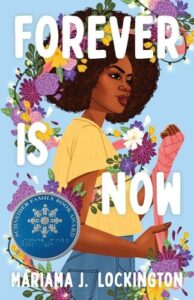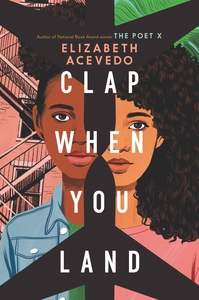Buy this from Bookshop.org to support local bookstores and the Lesbrary!
Content warnings: biphobia, racism, police violence
Forever is Now by Mariama J. Lockington tells the story of Sadie, a Black teenage girl with anxiety that develops into agoraphobia after a truly terrible day. Her girlfriend breaks up with her and they witness an incidence of racist police violence. The idea of leaving home fills her with overwhelming dread. Anything could happen. Anyone can be lost. But the world doesn’t stop and Sadie feels compelled to help, somehow, find justice for the young woman she saw assaulted.
I am not in the majority with regard to this book. It has a very high rating on Goodreads, and I can see why. It feels authentic. The angst and teenage experiences are relatable. The representation is strong. Pop culture references are very current and the fictional social media network is both understandable and realistic. From a teenage perspective, it’s a strong read.
The cover is also fantastic. The book ultimately focuses on Black joy and the cover reflects that. Rather than showing Sadie at her worst, her most anxious, her least put-together, it shows her pretty and happy and smiling. It shows her thriving. For a book about a mental health crisis to focus on the main character at her best and a book about Black joy to present a Black girl looking happy, those are great choices.
Unfortunately, from a literary perspective, it needs work. I don’t mean to be overly harsh; the book certainly has strengths. They’re just not fully integrated or realized. Sometimes it’s minor things, but for an example, Sadie’s little brother desperately wants her to come to his end-of-camp cooking event, and that is mentioned several times. The approaching deadline is clear to readers. However, Sadie doesn’t seem to care. That missing element in a character-centric narrative really weakens engagement. Throughout the narrative, Sadie feels extremely well-developed, but others around her don’t, and the way the narrative bends around her becomes frustrating as the story develops.
The book also just needed an editor. This is indicative of a larger trend in publishing. There were typos in the manuscript; a line editor should have caught those. There was also some confusion since dialogue, thought, and things Sadie wishes she said were all indicated with italicized font. These are things that should have been fixed in the pre-production process.
I think this book has a lot to say and a lot of potential. It needed a better team working to develop it—a couple more drafts and it would have been incredible. Overall, I would deem it very okay.


